- Home
- Studs Terkel
P.S. Page 13
P.S. Read online
Page 13
But it was so deft and so good. You and he—I think he’d have been the man who was being asked for the dime, and it would have been quite a marvelous song, I’m sure.
Right, and I’m sure he would have given the fellow a half a dollar.
Yeah, given him a half a buck! That’s right. So that was his hallmark as, you know, “You’re the tops, you’re the Coliseum,” is his. An example of yours, from that marvelous musical Finian’s. I’ll ask you what you had in mind in Finian’s and what comes out on the stage, too. “When the Idle Poor Become the Idle Rich.” This is witty, it’s funny, of course, the turn of a phrase; at the same time, what a comment. Why don’t we hear part of this.
This is what I am missing, Studs, in today’s writing, and what I deplore, and why I will always be against it. I have no communication with it. Because when you lose humor, you’re in disaster area. Show me a Hitler and I’ll show you no humor. Show me a fascist state and there is no humor. Show me a democratic state . . . We were noted for our Mark Twains, our Franklin Roosevelts, or Lincolns. All the great guys who had humor and gave us a sense of humor. Now, a song like “When the Idle Poor Become the Idle Rich” is profound. In fact it took Shaw, Bernard Shaw, a whole play, Pygmalion, to make the same point. Where he took a flower girl from the street and had a bet with Higgins that he could, with a little money, educate this girl and give her an accent so that she would not be distinguishable from anybody at Buckingham Palace. In other words, when the idle poor become the idle rich, you take on the same coloration as the rich and the cultured.
I’m thinking also about the phrase “and every relative will be a Rockefellerative.”
Now we’re getting into the technique of using profound political ideas in an entertaining and titillating way. And this is another thing I miss in today’s lyric writing. I don’t find the playful, the adroit, the ingenious use of phrase. So that people can laugh and think at the same time, and be left with meaning. And not be clobbered over the head, you know, with sledgehammer phrases. Because people run from polemics but they don’t run from laughter.
You once told me something on this very point, the fact you don’t like to hit something on the button. . . . There’s a subtlety, and it’s that that provides the—
That’s always the most subtle way of getting an idea across. The subtle way is through what Churchill called “the soft underbelly of the soul,” you see. And naturally, I mean, that kind of a subliminal and subtle thing doesn’t arouse people, doesn’t make them angry. It makes them listen, it makes them laugh, and it makes them swallow the gilded and sugared pill.
You know, one of your hallmarks is the use of the same word, the same word assuming a different meaning. A classic would be from Finian’s Rainbow: the leprechaun, Og , suddenly realizes he’s like Cherubino in The Marriage of Figaro. Hey, he’s got that feeling for that girl—girls. And here, “When I’m Not Near the Girl I Love.” If ever there were a classic case of using one word in fifty different ways . . . “When I’m not facing the face I fancy, I fancy the face I face.”
Well, this is the art of songwriting, of taking a great idea and expanding it, but expanding it with surprise and twinkle, so that the audience is waiting to see, well, now, how is he gonna top this? How is he gonna make this point again? But you keep topping it, and topping it, and topping it. So the reason they’re titillated is because they love the play on words; they’re fascinated with it. And what they are absorbing is also an identification with the terror of becoming mortal.
You remember, this song was written for a leprechaun who was becoming mortal and began having the sex feeling, the sex urge. That’s a terrifying thing for a growing person. It’s one of the hardships of becoming mortal, of feeling naturally that it’s a beautiful and lovely thing, sex, and that his nature tells him so. But his society and his church tell him otherwise, say it’s immoral; it’s indecent. And the conflict that the poor human being who is growing up is in, if it’s stated in human terms, becomes a very laughable thing. And if we can laugh at the idea, we will learn how to cope with it.
In other words, whatever follies we have, whatever problems we have, if we don’t feel bitter about them, and get mad and argue about them, but see them as follies and know how to laugh at them, the solution will come quicker and more peacefully. And this applies to almost everything in life, whether it’s war, whether it’s the conference table right now going on between Russia and America. Imagine if we had Mark Twain on this side and if they had Bernard Shaw on their side how fast there would be peace in this world, through humor. But we haven’t.
And that, of course, being what you’re talking about. On this subject, you’re the lyricist, of course understanding the human heart, the frailties, as well as the strengths of this sad species, and yet this wonderful . . .
There was a man, Clifford Durr, whom you’ve heard of; you know his wife, Virginia Durr, fought way back for equity for all. Clifford Durr was FCC commissioner under Roosevelt, and he said, during the Selma–Montgomery March—Cliff was watching the scene; he was a participant, too—he said, “You know, this human species, this race, man; man created Auschwitz, yet he wrote ‘Ode on a Grecian Urn.’ Man committed the most awful atrocities, yet he charts the stars. Man has done horrible things to his fellow, yet he dies for a faith.” And yet, just as the psalmist says, he’s all. So both are in us, and you’re saying, with that humor, to probe the frailties, at the same that which makes the human human. If I can be Harburgian for a moment, using your phrase, that which makes the human human.
Yes, but to become human is very inhuman most of the time.
Another aspect, and yet related, of Yip Harburg’s giftedness, is his rhymes. We’re talking about what is the nature of rhyme in verse, in contrast to lyric for a song. At This Point in Rhyme. He’ll be reading from that. And the other—perhaps you can ask for it and maybe they can reissue that—Rhymes for the Irreverent. So the subject of verse and you. And on this very subject of the human heart and human frailties.
You hold in your hand At This Point in Rhyme. Why not try a few of them, we’ll talk about them, and I’ll try a few from your other book, Rhymes for the Irreverent.
All right. Well, of course, you know that I’m always fascinated with satire, with making points that I like to laugh out of existence; for example, our attitude toward money, and how we worship it. Here’s a poem called “Heavenly Vaults.”
Where banks all look like temples,
And temples look like banks.
Where does one count his blessings?
Where does one offer thanks?
You sense the holy places
By the faces in the ranks,
The bankrupt in the temples,
The worshipful in banks.
Here’s my little tirade against the songs I hear today, and it’s called “Music on the Rocks.”
Hail the songs, the latest rages,
Dripping from guitar and pen,
Are destined for the ages,
Like, you know, I mean, from five to ten.
I’ve got to ask you something, Yip, that suddenly occurred to me. As you’re reading these rhymes you’ve written, can they—writing verse and writing lyric—can they be put to music? Would they be difficult to put to music?
Yes. They could be put to music by the kind of music you have today, that is three chords and—I can make up any song that you hear on the spur of the moment, instant music. To do what they call folk music, I can take any one of these things and do it. But I couldn’t do what Arlen or Gershwin or Porter did with music, I mean, to write a melody with ingenious metric involvements, and to fit words to them. You can take any one of these songs like the one I just read.
But that wouldn’t be it, though; that would not be it.
It wouldn’t be it. I can do this. [Sings in mock folk style] Oh, where banks all look like temples / And temples look like banks / Where does one count his blessings? / Oh, where does one offer thanks? I can do that with a
ny song.
Lyric writing, with the music of Harold Arlen or Burton Lane, now that’s something else, isn’t it? Now we come to a fusion of two forms.
But I would have to get a tune like [Sings] Da-di-da-da-di / Dum-da-di-dum-da-di-dum / Da-di-dum-da-dum . . .
Oh, I love that.
That’s a powerful, beautiful song. Or you take a thing like “Over the Rainbow,” which Harold wrote. “Over the Rainbow,” when you consider it, it’s a theme for a symphony. Listen to this: [Sings] Bum-bum-bum-da-da-da-dum / Bum-da-da-dum . . . You can write a symphony around that, but you can’t write a symphony around the folk song.
No. There, too, in “Over the Rainbow,” the care, the jeweler’s eye here. The care . . . The word “over”; you had to work for that, didn’t you? You had a certain reason.
That’s right, because we had to work for sound and for the emotion of the tune. For example, given a tune, which was written first, like [He sings] da-di-da-da-di-da . . . I couldn’t use consonants. I couldn’t say, “Say, bud.” It wouldn’t sing. I had to use open vowels. And look, [Sings] Somewhere over the rainbow . . . The o comes right underneath. And comes right into the thing, and that was an important part of the writing. So on top of the playfulness of words, on top of the meaning and the poetry, the sound had an importance in it. Today you don’t have to worry about that at all; there is no songwriting.
You’re also talking about you and your colleagues and that whole background, and the reading, the verse of Gilbert to the music of Sullivan. But also the French writers of verse, and for that matter the Greeks and the Latins, the Romans. You really had—
Yes, we were well versed in all the French forms, the ballad, the triolet, the rondo, the villanelle, the sonnet. And these were highly disciplined. You never were permitted to use an oracular rhyme, or a tonal rhyme like home and tone. There is no rhyming today, and there’s no poetry today.
Do you think it’s because there is a lack of continuity? That there is no sense—we’re told many of the young lack a sense of history. I’m talking about the pop song—
Let’s say lack of education. I don’t know what the youngsters are learning in school today. I think they’re learning how to photograph; they’re learning how to cook; they’re learning how to put wires together to make a radio set. But the humanities are out. Nobody knows who Longfellow was anymore. I asked some kids about, you know, “The Village Blacksmith.” They don’t even know that.
Let’s continue with more of the verse. Oh, I know, the difficulty of writing a lyric for a song as against verse. Dorothy Parker, who was so marvelous with her verse—
She was great, impeccable.
Could not do it; could not do lyrics for a song.
Well, to make the transition from verse writing to songwriting is like a leap from Peter’s foot to Satan’s knee, or Satan’s foot to Peter’s knee. It’s an altogether different medium. Verse writing is an intellectual pursuit. You sit at home with a book, you are quiet, you absorb the thought, you chuckle to yourself. A song done in the theater is an emotional explosion. At the end of it you expect applause. You’ve got to move an audience, not only with the words, but with the emphasis on the music.
So there’s both. Whereas verse could be for reading and for offering, reciting, the lyric of a song is theatrical. It is very, very oral, audio.
Right. That’s why we call it act one, act two. You act things out. When you act things, you’re dramatizing, to have drama, song, give you that extra dimension that plain conversation does not give you. It’s the same as novel writing and histrionic writing, dialogue writing for the stage. They’re two different things. One has to have movement, emotion, drama, force, explosion. The other has to have intellectual perception, peace, absorption, in a quiet way. And that’s why for every thousand novel writers and prose writers, there’s one playwright, all right.
Shaw did both, of course; he could do both.
Shaw was a master of both. But not only that; he was not only a master of prose and the stage, but he was a master of political science; he was a master of what the world was about. He knew the theory of evolution, the Darwinian theory. He knew Freud. In other words, he was a total man. And to be a good writer, even a lyric writer, you must be a total man. You must know you’re living in a world of Darwin, and Freud, and Shaw, and Einstein. If you don’t know that, and if you don’t combine all these things in an entertaining way in what you do, then you’re meaningless; then you’re only getting a hit record and making a million dollars.
You’re what Lillian Hellman called “a kid of the moment.”
That’s right; that’s right.
But you are a kid of many, many moments, sir. Yip Harburg. More of that verse. I’ll take a whack at the earlier book, too. While you’re looking for a verse, this is from an earlier book that I hope is available. There are three brief ones here. I’ll read “Agnostic,” “Atheist,” and “Realist.” “Agnostic”:
No matter how much I probe and prod,
I cannot quite believe in God.
But, oh, I hope to God that he,
Unswervingly believes in me.
“Atheist”: Poems are made by fools like me,
But only God can make a tree.
And only God who makes the tree,
Also makes the fools like me.
But only fools like me, you see,
Can make a God who makes a tree.
And here goes “Realist”: For what we are about to receive, oh, Lord, ’tis thee we thank.
Said the cannibal, as he cut a slice off the missionary’s shank.
The realist in me.
What have you from At This Point in Rhyme?
Well, here’s a couple I seem to like. This is called “Fail Safe.”
It’s a hundred billion dollars,
Every year at your expense,
For the Pentagon to gadget up,
Our national defense.
But it’s comforting to know,
That in the up and coming war,
We’ll be dying far more safely
Than we ever died before.
That’s almost Shavian, too. Yet it’s yours, so it’s Harburgian, though; that’s the irony. Just connecting that, a postscript to that one is one of yours here, “Fish and Fashion.”
When the nuclear dust
Has extinguished their betters,
Will the turtle surviving
Wear people neck sweaters?
That’s a fashion note.
This one is called “The Enemy List,” of which I happened to be a victim once.
Lives of great men all remind us,
Greatness takes no easy way.
All the heroes of tomorrow,
Are the heretics of today.
Socrates and Galileo,
John Brown, Thoreau, Christ and Debs,
Heard the night cry “Down with traitors!”
And the dawn shout “Up the Rebs!”
Nothing ever seems to bust them,
Gallows, crosses, prison bars.
Though we try to readjust them,
There they are among the stars.
Lives of great men all remind us,
We can write our names on high.
And departing, leave behind us,
Thumbprints in the FBI.
Oh, yeah. That’s, I would say, quite contemporary. You wrote that a year or so—a couple of years ago. There again, that’s the old story, isn’t it? There, in your seemingly lighthearted way, that’s the old truth, isn’t it? Those that call the shots at an early time are called traitors—
And years later they’re called patriots. Yeah. That happened to a fellow named Tom Paine, remember? Galileo.
Here’s one, on this very point. You open up with the question of Pontius Pilate. The question: What is truth? And here are your four lines.
The truth is so top secret,
It only stands to reason,
That anyone exposing it,
Is cul
pable of treason.
I have one. I have some people who are my favorite poison ivies, if you’ll forgive me. And this is called “A Saint He Ain’t.” It’s a person I have to listen to every time I turn the radio on, once in a while, by mistake.
Good St. Paul and Vincent Peale,
Are men of wholly different steel,
Yet both of holy calling.
St. Paul is most appealing,
And Peale is most appalling.
[Chuckles] Here’s one. It’s about critics. This is Shaw—you’re quoting Shaw at the beginning.
“The professional critic is a frustrated writer”—GBS. Here’s Harburg.
When the critic, with all his frustrations,

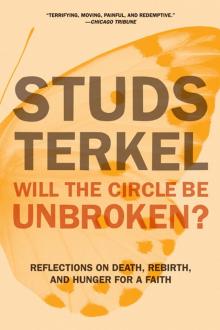 Will the Circle Be Unbroken?
Will the Circle Be Unbroken?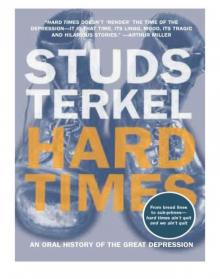 Hard Times
Hard Times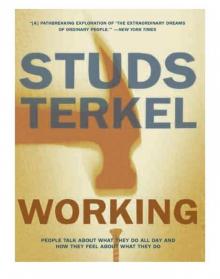 Working
Working Touch and Go
Touch and Go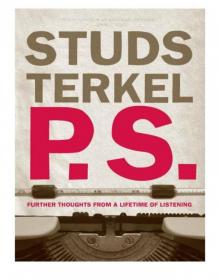 P.S.
P.S.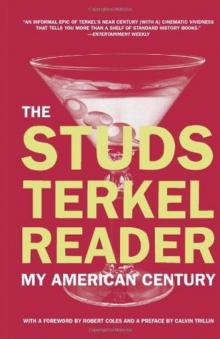 The Studs Terkel Reader_My American Century
The Studs Terkel Reader_My American Century